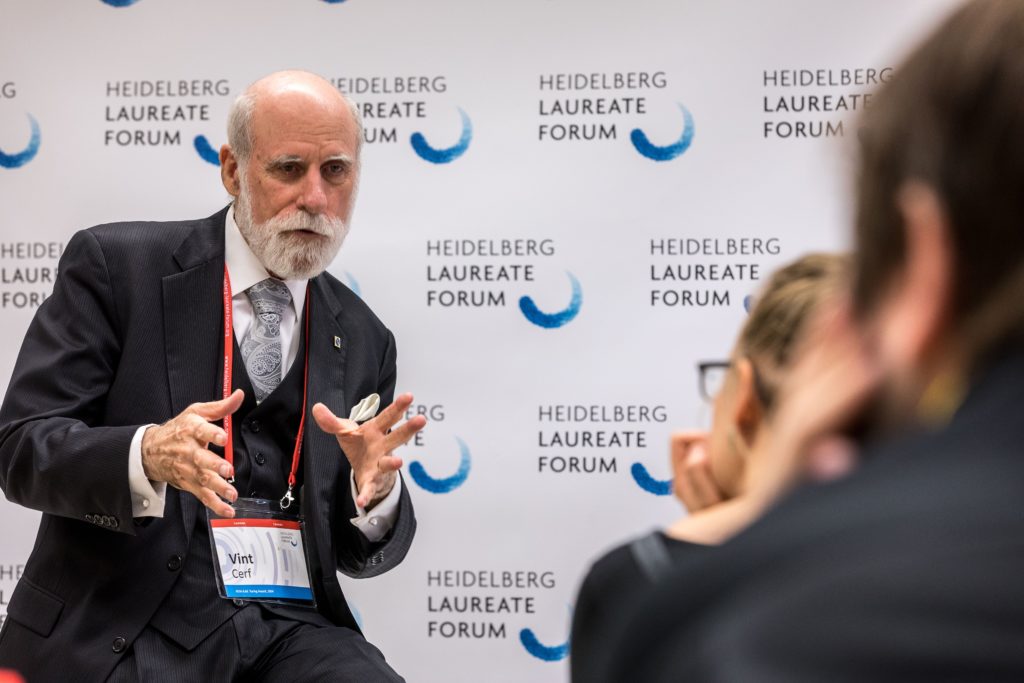Vint Cerf, who along with Robert E Kahn won the ACM Turing Award in 2004 for his work on the TCP/IP protocols underpinning the Internet, is one of the Laureates at this year’s HLF. On Friday he’ll be giving a lecture on an ‘Interplanetary Internet’, the protocols needed to deal with the unique challenges posed by telecommunications in space. But on Monday afternoon he chatted to a small group of journalists and bloggers on a wide variety of topics. With apologies for anything I’ve mangled, here’s a short selection of quotes from the man himself.
“I haven’t been mobbed so far”
On his relative popularity here compared to last year’s HLF. I’m sure this state of affairs will not persist.
“You have to introduce the house to your guests”
On the difficulties posed by an Internet-of-Things enabled home. Cerf discussed the problems you face when you have perhaps fifty devices in your house, which you want to be able to control, and perhaps some your guests should be able to control (after they’ve been introduced). Your guests will leave and should then lose their control, but you should keep yours when you leave. All of these interactions need to be correctly authenticated, to prevent unwanted requests being honoured. There was particular interest from the room in the possibility of an internet-enabled fridge, suggesting recipes based on what ingredients it’s holding — and perhaps unexpectedly suggesting diet recipes after a chat with your connected bathroom scales.
“I’m not ready for that world yet”
On an internet-of-things toilet.
“Tools that help us do things that would be hard for us to do”
Cerf was generally upbeat about artificial intelligence, considering it mostly as a tool to augment the limited ‘wetware’ of our own brains. He was skeptical of the Skynet-has-attained-sentience scenario of an AI usurping humans; his concern was focused more on the risks when simpler algorithms are given more and more autonomy to make decisions.
“We had not anticipated that particular scenario”
The risks of autonomous algorithms are of course particularly noticeable in the area of self-driving cars. Cerf related a couple of stories from his work in this area, including an instance when an autonomous car, being monitored remotely, unexpectedly stopped at an intersection, and remained still for longer than seemed plausibly necessary. This turned out to be because, in Vint’s words, of a “woman in a wheelchair chasing a duck with a broom” (I think the woman had the broom rather than the duck). These unpredictable situations aside, he seemed optimistic about the possibilities of driverless cars, citing their ability to communicate with each other to coordinate movements, for example when one car needs to merge into traffic: it can ‘talk’ to the other cars and agree on a time to carry out the maneuvre, and the other cars will politely make room. This sort of coordination is something human drivers don’t do very often, he said, “especially in California”.
“A bus full of schoolchildren or a car full of nuns”
What should your self-driving car do in an emergency when it has no choice but to crash into one of two vehicles? Cerf was less impressed with these trolley-problem ethical quandaries routinely employed when talking about the issue, considering them mostly a false dichotomy — if only because a car is unlikely to know the religious interests of the occupants of another vehicle.
“Zero probability of ice-cream”
In a reassuring demonstration that even their Chief Internet Evangelist can fall into the same Google traps as we all do from time to time, Cerf told a story from a previous visit to Heidelberg. Looking at a weather forecast, he was surprised to read among the cloud cover and rainfall predictions a forecast on the availability of ice cream. It turns out to have been a German page that Chrome had auto-translated before he could even realise he wasn’t reading it in the original language. The dessert prediction was in fact a much more prosaic mistranslated forecast for ice. (Based on a stroll down the Hauptstrasse, the translated prediction is a poor one: gelato shops seem to be enjoying as much popularity as in my hometown of Manchester.)
“Almost every time I mess up, it’s because I made an assumption that later turned out to be wrong”
On the pitfalls of assuming an algorithm works as presented; but surely a maxim with wider applications in science and in life.
